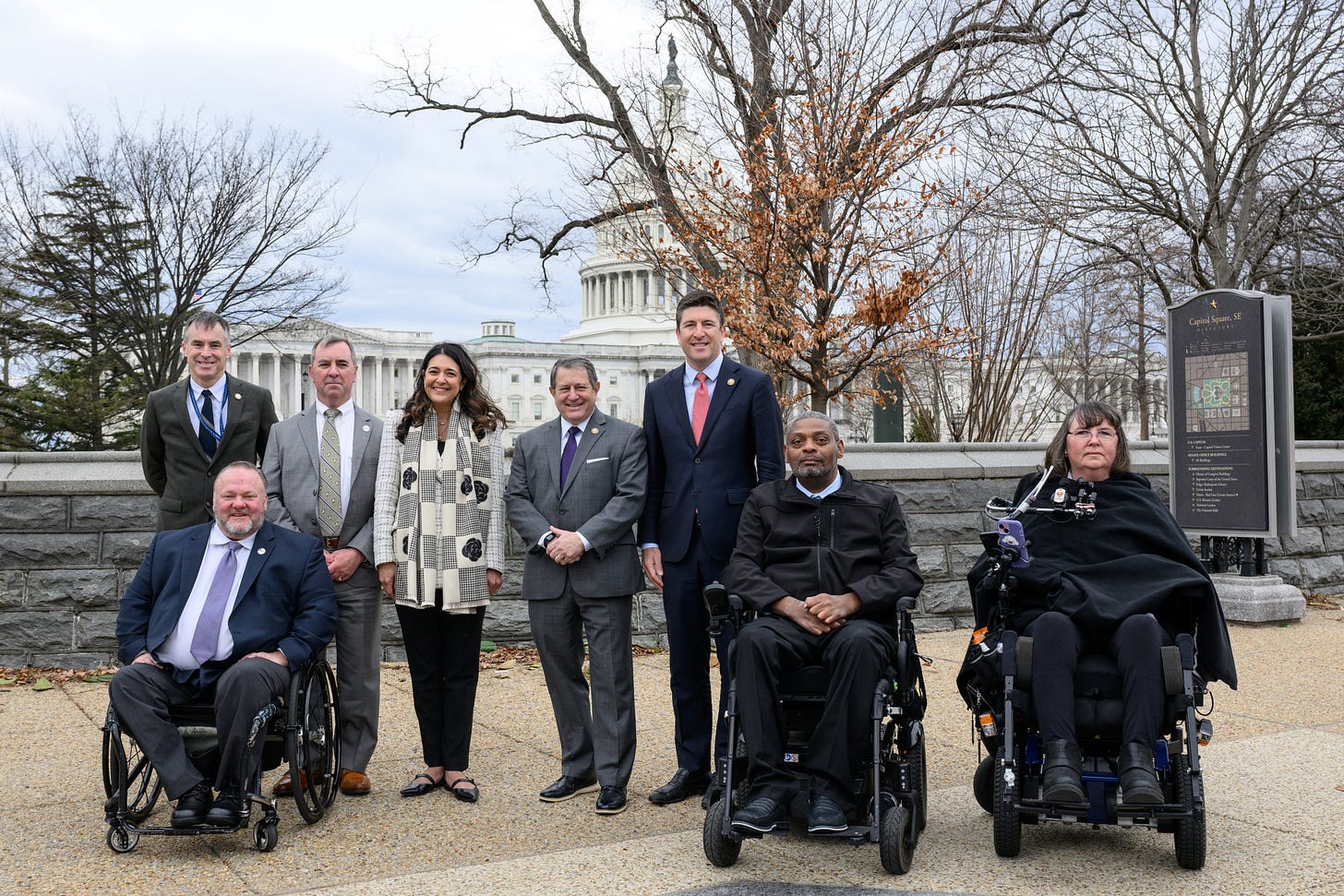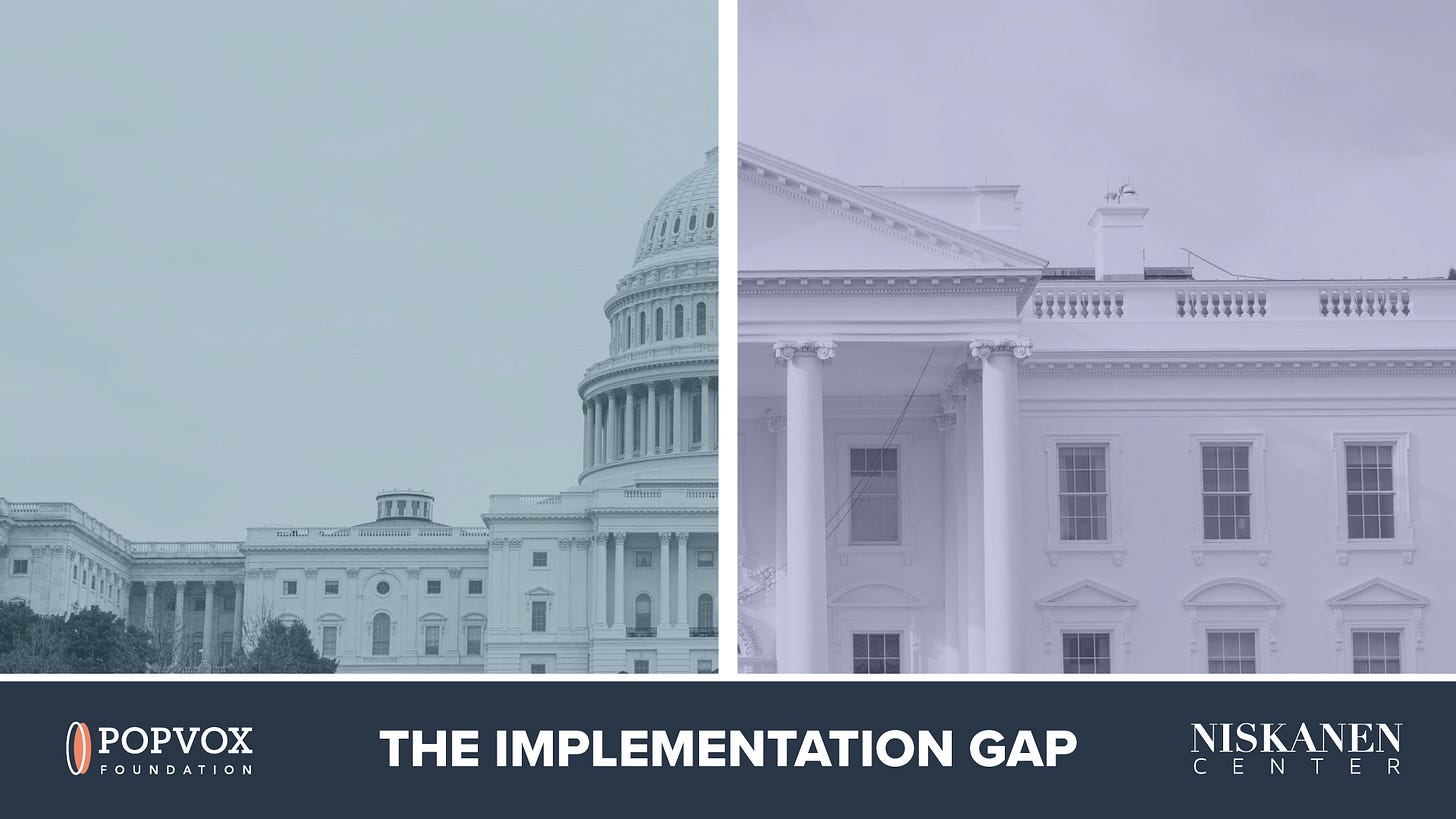Future-Proofing Congress: Policy Implementation Mastery & AI Tools for Today's Staff
Background on next week’s expert panel on turning legislative intent into outcomes
With all of the changes across the federal government these days, I am reminded of a quote by Senator Robert F. Kennedy that I came across when I first started on the Hill:
“Few will have the greatness to bend history itself; but each of us can work to change a small portion of events, and in the total of all those acts will be written the history of this generation.”
For all you interns and staff assistants answering calls, LCs replying to mail, caseworkers fielding questions, and LAs, LDs, and Chiefs navigating the policy landscape to ensure the best representation of your constituents: you’re doing an amazing job rising to the needs of the current moment. You’re making a difference every day.
Being a part of Congress is a borrowed power, and wielding it to craft effective, intentional policy takes an immense amount of restraint, persistence, wit, and grace. Outcomes-driven legislating (ODL) is an approach that I wish I would have adopted more often when I was an LA (and one that you may already be experimenting with and not realizing). It is the concept of a closed loop for policy creation and feedback. Instead of explicitly describing how a policy gets implemented, ODL instead takes the approach of crafting a law to allow the individuals implementing it to do so in a way that makes the most sense. This flexibility allows the policy approach to adapt to real world situations to achieve the law’s intent rather than be locked into one approach that theoretically should work. As you and your office continue to receive feedback and ideas about how the government should improve during this time of change, I encourage you to explore this mindset shift in policy ideation.
Writing legislation with a focus on the intended effect (the what) rather than being overly prescriptive on implementation (the how) allows for common sense solutions to be employed on the ground. This can directly improve government service to constituents and lead to increased efficiency and effectiveness, especially post-Chevron. If you want to learn more about this approach from some experts who have seen first-hand how policy implementation has missed the mark in the Executive branch, come join us for this discussion cohosted by POPVOX Foundation and the Niskanen Center:
The Implementation Gap: Turning Legislative Intent into Executive-Led Outcomes
Monday, March 24, 2025 | 2-3 PM EDT
South Congressional Meeting Room (CVC 217) & Virtually
I’ll be there, too — so please come up and introduce yourself and grab a snack. Until then, keep up the good work, changemakers.
Also in this month’s newsletter:
New Capitol ADA transit zone
Overloaded caseworkers
Proxy voting for new parents
District offices in GSA-owned buildings
Warmly,
Aubrey Wilson
Director of Government Innovation
POPVOX Foundation
New Capitol ADA Transit Zone
This month, the Committee on House Administration (CHA) cemented a legacy item that has been in the works for years: the designation of an official ADA drop off and pick up zone. The House Select Committee on the Modernization of Congress identified the need for a level, safe, and easily navigable location for individuals in need of additional accommodation. Getting this project completed required bipartisan leadership and coordination from the CHA, Legislative Branch Appropriations, House Architect of the Capitol, House Sergeant at Arms, and US Capitol Police. CHA inaugurated the zone by welcoming veterans to campus earlier this month. This is just one more example of Congress future-proofing itself.

Casework Harbingers
It’s not just you: the workload on Congressional staff – in both DC and across the districts – is heavier these days. What if it’s not just a phase? On her Voice/Mail substack, Anne Meeker (POPVOX Foundation deputy director and former caseworker) recently examined how periods of Executive branch transition create unprecedented demands on Congressional casework teams. Case in point: Senate switchboards recently handled 1,600 calls per minute compared to a normal forty. When constituents cannot reach federal agencies, they turn to Congress, effectively transferring capacity from the Legislative to Executive branch. This pattern, observed during various government transitions, shutdowns, and the pandemic, diverts staff resources away from policy work to address urgent constituent needs. The long-term effect? Depleting Congressional offices' ability to fulfill core Article I responsibilities. So what should Congress do? Anne does not leave you hanging.
Parents in the House
I gave birth to twin girls last October. As an employee of a modern workplace, I was able to take November through January away from work for maternity leave. My husband, who is employed by a federal agency, was likewise able to take nearly as much time off. During those months at home, we were still constituents and continued to be represented by our Members of Congress (thanks, Rep. Raskin [D, MD] and Senators Van Hollen [D, MD] and Alsobrooks [D, MD]!). If our positions were reversed — if one of our Members of Congress were welcoming the birth of a child (or two) and took parental leave — as constituents, our voices would not be represented on the House floor during that time since the current rules do not allow for proxy or remote voting. Danielle Stewart, POPVOX advisor for Congressional initiatives, is a previous chief of staff and mom of an adorable one-year-old, and has been leading the work on our team to bring attention to why these policies need to change.
Huge shoutout this month to Representatives Pettersen [D, CO], Luna [R, FL], Lawler [R, NY], and Jacobs [D, CA] (and all Members) who are driving this change to the House that will future-proof the institution for generations to come. Thank you and your teams for preserving constituents’ ability to be represented in Congress while making it so that young women and men can be part of the Chamber and have a family.
What to Do With DOs?
Does your team have a district office in a GSA-owned building? If so, you might want to prepare for the possibility that your lease is terminated. Roll Call’s Justin Papp connected the dots on potential plans by the Administration to offload numerous GSA buildings that could impact more than four-dozen district offices. Whether the real estate divestment plans come to fruition or not, it provides an interesting opportunity to (re)highlight that the Select Committee on the Modernization of Congress explored how the House could partner with GSA to negotiate better leasing rates for district offices across the country to save taxpayer money.
International “Fix”- Inspiration from Parliaments Around the World
TL;DR: The Inter-Parliamentary Union (IPU) has released an incredible summary and key takeaways of their January event exploring how AI is reshaping public engagement with legislatures around the world. If the summary is too long for you, it's a great opportunity to use your chamber’s approved GPT to summarize the summary. Oh, and if you have not yet played with the Library of Congress’ Citizen DJ, you’re welcome.
International Fun Fact, courtesy of ModParl: Italy accounts for 80% of AI-related legislative use cases in Europe.
For more news from international legislatures, subscribe to our Modern Parliament (“ModParl”) newsletter.
Stay in the Game
Happy spring! Take advantage of the warming weather and take a walk on the Capitol grounds. Catching up with a colleague or brainstorming a new project? Instead of sitting in an office or cafeteria, try a walking meeting. Walking meetings enhance cognitive function by boosting blood flow to the brain and can also spark creativity. Plus, walking and talking side by side can make it easier to share ideas. Don’t have a meeting planned? Catch up with a policy podcast or hearing you missed. Walking is a great way to integrate physical activity into your busy workday. And be sure to take a minute to admire the spring flowers, especially by the Bartholdi Foundation!
Have a favorite self-care tip you’d like to share? Email us!
Event: Master the Art of Policy Implementation
As legislative staffers, getting a bill signed into law is only half the battle. The real challenge? Ensuring that law achieves your Member's intended impact when implemented in the real world.
To tackle this timely policymaker challenge, join Niskanen Center and POPVOX Foundation for a discussion on turning legislative intent into executive action on Monday, March 24 from 2-3 PM EDT in CVC 217 and virtually.
Speakers:
Marci Harris, cofounder and executive director, POPVOX Foundation (moderator)
Jennifer Pahlka, former US deputy CTO and senior fellow, Niskanen Center
Andrew Greenway, founder, Public Digital (UK)
Building off of Niskanen’s recent must-read, "The HOW We Need Now: A Capacity Agenda for 2025," we will explore practical solutions to help you and your boss draft more effective policies that deliver real results for your constituents and advance your Member's goals. Look for me at the event, I’d love to hear your feedback on how we can design this discussion series to best serve you.
Shout Outs & Events
A Celebration of Life for Elise Bean, cofounder of the Levin Center and oversight pillar in the Congressional community, is being held on April 9 at 4 PM in SR-385, Senate Russell Building.
AEI and Catholic University’s Center for the Constitution and the Catholic Intellectual Tradition are hosting an event, “Unwritten Administrative Law,“ discussing the June 2024 decision in Loper Bright Enterprises v. Raimondo that ended Chevron deference. The event is taking place virtually and in person on March 26 at 12 PM EDT.
The Bipartisan Policy Center will host “Legislating After Loper: Practical Solutions for a Post-Chevron Congress” on March 27 from 9:30-10 AM EDT at its office and online.
Here is some inspiration for innovation in honor of the late Rep. Grijalva [D, AZ] — a quick read with a meaningful reminder.
Making your life that much easier: CRS reports are now searchable on Congress.gov.
New from Congress’ science and tech gurus: How the GAO supports the Leg branch with science and technology expertise.
Speaking of the GAO, it’s investigating potential Impoundment Control Act violations related to the current Administration's moves to halt federal funding across agencies.
The House CAO/HIR approved Signal for sensitive information and added it to the House Mobile App catalogue, a noteworthy tool that can assist staff in engaging with whistleblowers.
We all seem to know someone looking for a job these days. There are some great opportunities at the Foundation for American Innovation and the Congressional Management Foundation.
Speaking of jobs: see how LLMs can dig into the data of the Congressional job bulletin.
Congressional treasure: The House passed legislation authorizing the Architect of the Capitol to create and bury a time capsule in honor of the semiquincentennial of the Declaration of Independence to be unsealed on July 4, 2276.
The Future is Now
Amazon’s new Alexa+ AI voice assistant will soon be available.
Science fiction fan and Congressional nerd? This is worth a read.
What is coming next? Parliaments around the world have created forecasting bodies.
Former Google CEO Eric Schmidt says AI could usher in a new renaissance.
Another opportunity to use a GPT to summarize key takeaways from an impactful report: The Future Today Strategy Group’s 2025 Tech Trends.
A Trans-Atlantic example of GenAI use in a policymaking setting: How the UK tech secretary uses ChatGPT for policy advice (His ChatGPT records were obtained under the UK’s FOIA law!)
Computer programming jobs are plummeting in the wake of AI.
About POPVOX Foundation
POPVOX Foundation is a nonpartisan nonprofit that helps democratic institutions keep pace with a rapidly changing world. Through publications, events, prototypes and technical assistance, the organization helps public servants and elected officials better serve their constituents and make better policy.



